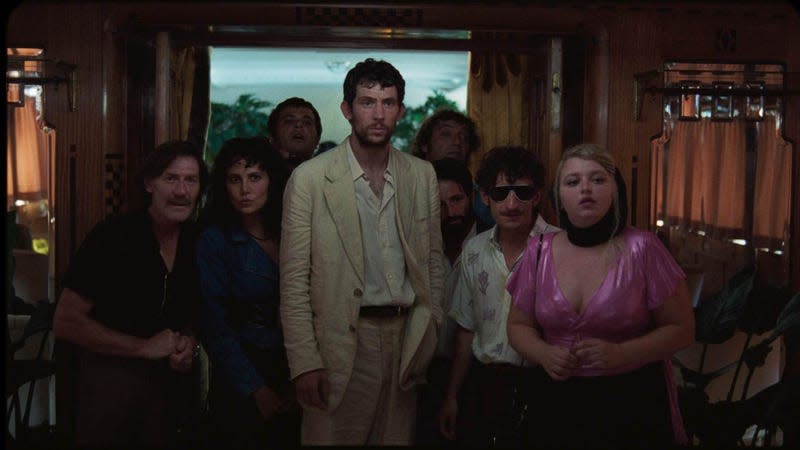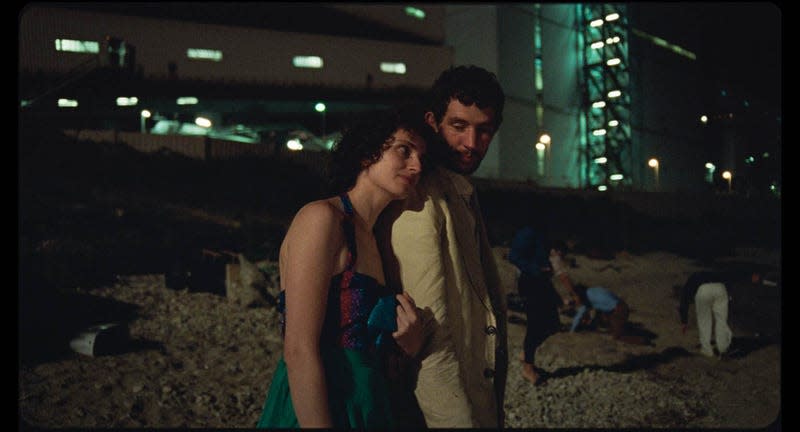La Chimera review: Alice Rohwacher's haunted Italian romance lives among the ruins

- Oops!Something went wrong.Please try again later.
- Oops!Something went wrong.Please try again later.
The past is so close you can almost touch it in Alice Rohrwacher’s romantic treasure hunt, La Chimera. Set in the liminal space between living and dying, better known as the Italian countryside, Rohwacher’s carefully excavated narrative unearths a funny and deeply satisfying meditation on loss and hope. Appropriately, half the joy of La Chimera is in discovery, making its plot brutal to discuss. We meet Arthur (Josh O’Connor, best known to American audiences as one of the The Crown’s Prince Charleses) in a dream. From his first-person perspective he admires the face of the woman he loved, lost, and is desperate to find again, Beniamina (Yile Yara Vianello). She haunts Arthur from just beyond his grasp, leaving behind a red string from the past that he longs to pull. Luckily, that’s what Arthur does best.
Arthur’s quest is for a holy grail of another sort. Returning to Italy hoping to reconnect with Beniamina and pay off a lingering debt, Arthur begrudgingly reteams with his old gang of Italian tomaroli, or tomb raiders. They scour for valuables found in their backyard, aided in no small part by—ahem—Arthur’s supernatural connection with Tuscany’s subbasements of yore. The tombaroli live among ruins, calling ramshackle shacks devoid of heat, furniture, or even floors home. At this stage, in the decomposing white linen suit he was seemingly born in, Arthur is starting to resemble the relics he hunts. He finds his first tomb at Beniamina’s home, where her mother, Flora (an effortlessly comforting Isabella Rosellini), resides. Flora’s parade of daughters and granddaughters encourages her to abandon her leaky flat for a nursing home, presumably leaving the house for grave robbers like Arthur.
Arthur connects with spaces from the past more than people. His grave robber’s intuition, aided by a divining rod to locate artifacts beneath the surface, is one of the film’s most vital connections to the ethereal power of its country. Rohrwacher, the Italian director who established herself as a burgeoning master of magical realism with 2014’s Cannes winner The Wonders, imbues 1980s Tuscany with a bewitching air. A character could break the fourth wall or disappear into the ether at any moment. Neither would feel out of place.
With the rounded edges recalling its 16mm photography, the film has an old-world feel, as if we’re seeing something uncovered from the past. Shot in 16mm, Super 16, and 35mm, the border left from 16mm celluloid remains regardless of the format, affording the movie a documentary verisimilitude that grounds the film’s magical elements.
Written with Carmela Covino, who contributed to Rohwacher’s Happy As Lazzaro and her Oscar-nominated short Le Pupille, and Marco Pettenello, Rohwacher’s script hides surprises behind every line, revealing elements of Arthur’s past and recontextualizing his present. Arthur doesn’t speak much, and even more rarely does he talk in his native English. After several scenes of people treating him as a local and an interloper, we learn he’s English (or maybe Irish). His slippery identity finds common cause with Italia (Carol Duarte), whose name can’t help but carry some groan-worthy allegorical charge. Characterized as tone deaf by Flora, Italia teaches Arthur to speak without using his voice, and the two commune via sign language.

Everyone in La Chimera has a tangible dream they can’t fulfill. For Arthur, it’s finding his lover. For the gang, limitless riches will facilitate a leisurely life. Their whimsy and earthly desires balance Arthur’s alienation, creating a dynamic often found in the fantasies of Hayao Miyazaki, the grouchy sorcerer surrounded by chuckling little sprites. But while they’re Spirited Away, Rohwacher reminds us that these graverobbers are cogs in a giant machine bent on commodifying the past, looting the magic buried beneath Italy and selling it for a price.
La Chimera enchants the viewer with its decaying spaces and lively performances. The tortured O’Connor holds great power in stillness and silence through his connection to the spirit world, a realm he wishes to join. That tension is felt as the people around him are reduced to barking animals consumed by greed; only Flora and Italia respect the spaces that no one owns and everyone owns. La Chimera is a formal delight that holds no shortage of surprises. It calls for further viewings, asking us to unearth the mysteries buried long ago. In Rohwacher’s world, magic is everywhere and nowhere, and the secrets of the past belong to no one and everyone. If we dig in the right spot, maybe we’ll find what we lost.
